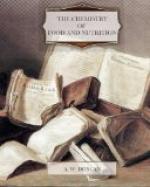a preparation is practically free from albumin, gelatin
and fat; all the nutritive principles except the saline
matter having been extracted. Liebig states that
34 pounds of meat are required to produce 1 pound
of extract. In 1872, he wrote “neither tea
nor extract of meat are nutritive in the ordinary
sense,” and he went on to speak of their medicinal
properties. Druit, in 1861, in describing the
effect of a liquid preparation of meat, states that
it exerted a rapid and stimulating action on the brain,
and he proposed it as an auxiliary and partial substitute
for brandy, in all case of great exhaustion or weakness
attended with cerebral depression or despondency.
In like manner, a feast of animal food in savages,
whose customary diet was almost exclusively vegetable,
has been described by travellers as producing great
excitement and stimulation similar to that of intoxicating
spirits. Similar effects have been observed from
a copious employment of Liebig’s extract.
Voit asserts, from the results of his experiments,
that extract of meat is practically useless as a food,
and other authorities are quite of the same opinion,
although they may value it as a stimulant and drug.
The Extra Pharmacopaeia, 1901, states that
“Liebig’s Extract or Lemco consists of
creatin, creatinin, globulin and urea, with organic
potash and other salts. It has been much over-estimated
as a food either for invalids or healthy persons;
still it is often valuable as a flavouring to add to
soups, beef-tea, etc., and it is a nerve food
allied to tea.” Meat extracts stimulate
the action of the heart and the digestive processes,
but as in the case of other stimulants there is a succeeding
period of depression. The British Medical
Journal says that the widespread belief in the
universal suitability of concentrated beef-tea is frequently
responsible for increasing the patient’s discomfort,
and is even capable in conditions of kidney inefficiency,
of producing positive harm. Some of the meat
bases, the leucomaines, have been found to possess
marked poisonous effects on the body. The manfacturers
of meat extracts continue to mislead the public by
absurdly false statements of the value of their products.
They assert that their extracts contain the nutritive
matter of 30, 40 or 50 times their weight of fresh
meat, or that one or two meat-lozenges are sufficient
for a meal. One company, asserts by direct statement,
or imply by pictorial advertisement, that the nutritive
matter in an ox can be concentrated into the bulk
of a bottle of extract; and another company that a
tea-cup full is equivalent in food value to an ox.
Professor Halliburton writes: “Instead of
an ox in a tea-cup, the ox’s urine in a tea-cup
would be much nearer the fact, for the meat extract
consists largely of products on the way to urea, which
more nearly resemble in constitution the urine than
they do the flesh of the ox.” Professor
Robert Bartholow has also stated that the chemical




